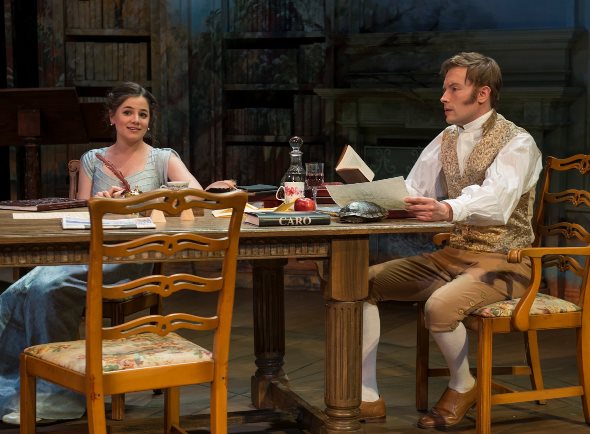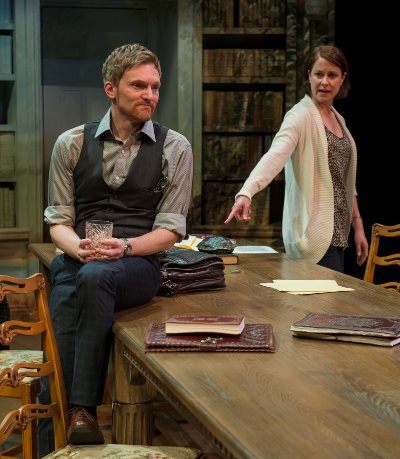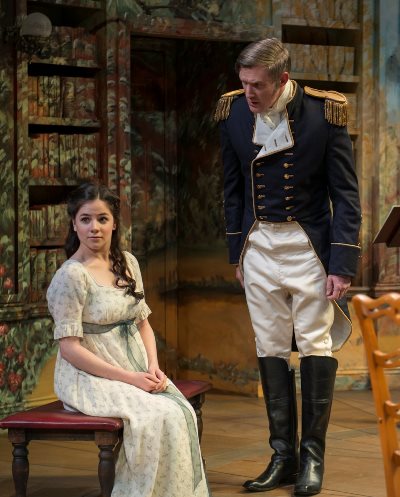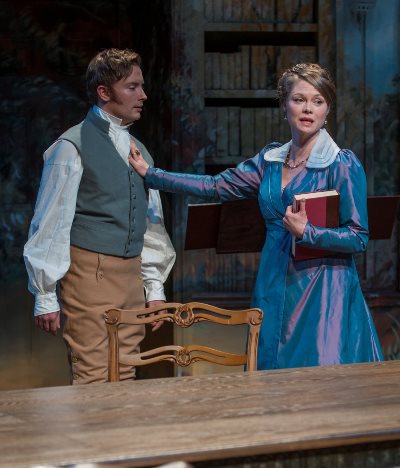‘Arcadia’ at Writers: Stoppard’s fine-spun play proves ideal opener for Glencoe’s new house
 Review: “Arcadia” by Tom Stoppard at Writers Theatre, extended through May 1. ★★★★★
Review: “Arcadia” by Tom Stoppard at Writers Theatre, extended through May 1. ★★★★★
By Lawrence B. Johnson
If a play, off the shelf as it were, could be tailor-made for the unveiling of a distinctive new theater, Tom Stoppard’s “Arcadia,” an intellectual romp with a touch of tragedy, is the perfect inaugural raiment for Writers’ splendid new home in Glencoe.
 Stoppard’s 1993 comedy of manners and chaos theory is a veritable sandbox for Writers’ founding artistic director Michael Halberstam, who directs the show. Halberstam’s stagecraft tells at every turn of a fine-tuned, fully engaged ensemble of actors who seem to revel in both the brilliance of the play’s language and the time-leaping scope of its interlaced themes.
Stoppard’s 1993 comedy of manners and chaos theory is a veritable sandbox for Writers’ founding artistic director Michael Halberstam, who directs the show. Halberstam’s stagecraft tells at every turn of a fine-tuned, fully engaged ensemble of actors who seem to revel in both the brilliance of the play’s language and the time-leaping scope of its interlaced themes.
On the surface, “Arcadia” is about two present-day British literary scholars, a man and a woman (of let’s say marriageable age), who collide when he descends on her family’s long-held estate in lathered hope of finding documents that will solve a historical mystery: why the poet Lord Byron suddenly bolted from England in 1809, leaving only the tantalizing note that he must depart for reasons he could not divulge.
Is it possible he killed a man in a duel? Ah, there – I’ve said too much, and without the requisite spoiler alert. Well, I shall make amends by noting that “Arcadia” isn’t about that anyway. That’s window-dressing, a catalytic red herring for the bigger story that’s playing out simultaneously, so to speak, two hundred years before.
Still, as the conniving scholar Bernard Nightingale and his wary but no less aggressive literary combatant Hannah Jarvis, Scott Parkinson and Kate Fry provide the sparks and laughs that well might lead to the incendiary stuff that got Francesca and Paolo into hot water back in the day. But that’s going too far back. “Arcadia” opens where Stoppard’s story really resides, in the early 19th century, at this same estate in Derbyshire. Collette Pollard’s simple set, dominated by a long table at the center, serves well in both of the story’s interlocking phases.
 Indeed, the play begins with an immediate intellectual conundrum, posed by 13-year-old Thomasina Coverly (the disarmingly bright-eyed and vibrant Elizabeth Stenholt) to her briefly flummoxed tutor Septimus Hodge (Greg Matthew Anderson, who ends in a tie with Stenholt for the show’s most nuanced and endearing performance).
Indeed, the play begins with an immediate intellectual conundrum, posed by 13-year-old Thomasina Coverly (the disarmingly bright-eyed and vibrant Elizabeth Stenholt) to her briefly flummoxed tutor Septimus Hodge (Greg Matthew Anderson, who ends in a tie with Stenholt for the show’s most nuanced and endearing performance).
I cannot disclose the riddle, but only the tutor’s answer: He says it means flinging your arms around a side of beef. I can also report that this solution touched off a roar of laughter from the audience. Trust me, it’s just too funny. But it’s also a set-up. Because this very smart girl presses Septimus for a better answer, one that squares with something she has overheard. And he complies, with analytical directness. Septimus is nothing if not analytical – and so, perhaps more to the point, is Thomasina.
One could argue that “Arcadia” is about Thomasina, that it’s a feminist tragicomedy. Sweet, effervescent Thomasina is that genuine article: a genius. Her mathematical intuition is staggering, and cheerfully off-hand. And beautiful. In a different arena of thought, Mozart must have been like that, though a better comparison in the present instance would be Isaac Newton.
What Thomasina’s open and dazzling mind lands on is nothing less than the rudiments of chaos theory, also known by its short-hand name as the Butterfly Effect: A butterfly flutters its wings in Brazil and storms precipitate on the far side of the world. Thomasina visualizes such a progressive mathematical model, with its allowances for chaotic irregularities. And she eagerly explains this to Septimus.
 Then along comes Thomasina’s mom, Lady Croom (Chaon Cross as a study in perpetual annoyance), who is quite preoccupied with and vexed by the redesign of the lovely garden she has always treasured as the very image of classical Arcadia. She pauses to ask Thomasina how old she is. Thirteen. That gets a laugh. But as scenes and years pass, and Thomasina’s intellect flowers, an impatient Lady Croom again asks the girl her age. Seventeen. Replies the grand dame: It’s time to marry.
Then along comes Thomasina’s mom, Lady Croom (Chaon Cross as a study in perpetual annoyance), who is quite preoccupied with and vexed by the redesign of the lovely garden she has always treasured as the very image of classical Arcadia. She pauses to ask Thomasina how old she is. Thirteen. That gets a laugh. But as scenes and years pass, and Thomasina’s intellect flowers, an impatient Lady Croom again asks the girl her age. Seventeen. Replies the grand dame: It’s time to marry.
In a paradox within a metaphor, we watch as Thomasina’s flame is extinguished. One moment, she prevails upon Septimus to show her how to waltz, something every young lady of 17 should know. The next moment – chaos, one supposes.
Throughout the play, time shifts back and forth from Thomasina’s world – where the great poet Byron indeed has paid a visit – to the present, the Byron mystery and the discovery of Thomasina’s work by a latter-day mathematician in the family (Christopher Sheard). On his laptop, he extends her math modeling infinitely beyond what she could have scribbled by hand even in a very long lifetime. He is astonished, even as the Byron skirmishes, the scholarly angling and coy dissembling, continue around him. Newton, behold the comet Thomasina.
Related Links:
- Performance location, dates and times: Details at TheatreinChicago.com
- Preview of Writers Theatre’s complete 2015-16 season: Read it at ChicagoOntheAisle.com
Tags: Arcadia, Chaon Cross, Collette Pollard, Greg Matthew Anderson, Kate Fry, Michael Halberstam, Nathan Hosner, Scott Parkinson, Tom Stoppard, Writers' Theatre


No Comment »
1 Pingbacks »
[…] “Amadeus” at Chicago Shakespeare, David Auburn’s “Proof” at Court, Tom Stoppard’s “Arcadia” at Writers, and Simon Stephens’ “The Curious incident of the Dog in the […]